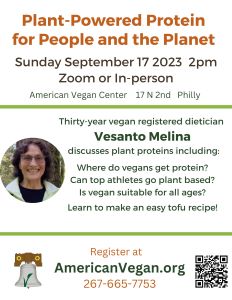Posted on
September 14, 2023 by
The VRG Blog Editor

Kasheri with Brown Rice
In a previous VRG Journal article Chef Nancy Berkoff shared Egyptian recipes she gathered when visiting her former students living in Egypt. Enjoy Kasheri with Brown Rice, Brown Rice Mujaddara, Makloubeh (layered eggplant), Vegan Kofta, Orange and Olive Salad, Khoshaf (compote), and Egyptian Lemonade.
Find the complete article here: Vegan Recipes from Egypt
Subscribe to Vegan Journal:
https://www.vrg.org/member/2013sv.php
Category
Uncategorized
Comments
0
Posted on
September 13, 2023 by
The VRG Blog Editor
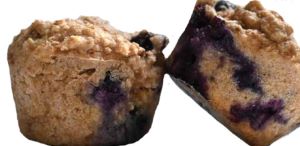
photo by Rissa Miller
Each issue of Vegan Journal contains a column called Vegan Cooking Tips written by Chef Nancy Berkoff, EdD, RD. In the recent edition she offers numerous egg replacer suggestions.
Read the entire article here: https://www.vrg.org/journal/vj2023issue3/2023_issue3_cooking_tips.php
To subscribe to Vegan Journal in the USA, see: https://www.vrg.org/member/2013sv.php
Category
Uncategorized
Comments
0
Posted on
September 13, 2023 by
The VRG Blog Editor
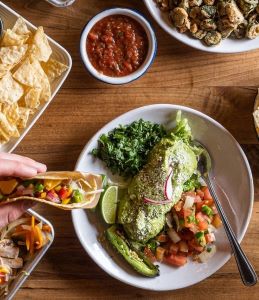
photo from Rio Grande Mexican Restaurant
The Vegetarian Resource Group will host a networking dinner in Denver, Colorado, during the annual FNCE meeting of the Academy of Nutrition and Dietetics. Within one mile of the Colorado Convention Center. The public is invited. Participants from Denver and places from around the country will have a chance to share veg related activities they have coordinated.
RIO GRANDE MEXICAN RESTAURANT BUFFET:
Chips and Salsa
Guacamole
Black Beans
Portabella and Squash
Grilled Peppers and Onions
Plain Rice
Pico de Gallo
Selection of Salsas
Flour Tortillas
Soft Drinks, Coffee, Tea
PLEASE RESERVE IN ADVANCE. SEATING IS LIMITED
$30 for The Vegetarian Resource Group and Vegetarian Nutrition Dietetic Practice Group members. $35 for nonmembers. Includes tax and tip.
Please prepay at vrg.org/donate. Write in the comments section names of participants and that it is for the Denver dinner. Or call (410) 366-8343, or mail payment to The Vegetarian Resource Group, P.O. Box 1463, Baltimore, MD 21203.
Category
Uncategorized
Comments
0
Posted on
September 12, 2023 by
The VRG Blog Editor
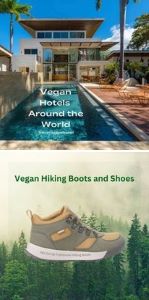
Be sure to follow The Vegetarian Resource Group on Instagram: @vegetarianresourcegroup
Category
Uncategorized
Comments
0
Posted on
September 12, 2023 by
The VRG Blog Editor

Mexican indigenous dishes, such as those that are part of Maya cuisine, are traditionally plant-based. Odette Olivares writes about these foods in the latest issue of Vegan Journal.
Read the entire article here: https://www.vrg.org/journal/vj2023issue3/2023_issue3_maya_vegan_foods.php
To subscribe to Vegan Journal in the USA, see: https://www.vrg.org/member/2013sv.php
Category
Uncategorized
Comments
0
Posted on
September 11, 2023 by
The VRG Blog Editor
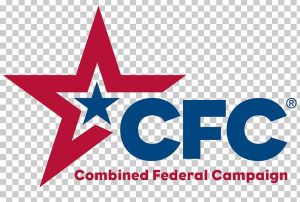
The Vegetarian Resource Group continues to be very busy on a daily basis. Below are some examples of successes and activities. Your support through Combined Federal Charity (CFC) or your Local/State Campaign is greatly appreciated! You can also donate directly to VRG at vrg.org/donate
Here’s a sampling of some of our accomplishments and outreach:
- The Vegetarian Resource Group Nutrition Advisor Reed Mangels, PhD, RD, did a presentation to Maryland Dietitians in Health Care Communities on Offering Plant-Based and Vegan Options: Why It Makes Sense and How to Do It.
- The Vegetarian Resource Group poll numbers were cited in The Hill, a political news publication, which is read by The White House, Congress, and others. See: thehill.com/changing-america/sustainability/3747206-vegetarianism-is-on-the-rise-especially-the-part-time-kind
- The Vegetarian Resource Group Nutrition Advisor Reed Mangels, PhD, RD, did an interview on Arirang TV, an English-language broadcasting station in South Korea, on vegetarian diets. She also authored the Guide on How to Go Vegetarian or Vegan in Psyche (digital magazine).
- Reed was interviewed for an article for Contemporary Pediatrics about nutritional benefits and/or drawbacks of veganism and vegetarianism in adolescents. The aim of this article is to provide general practice pediatricians with guidance and nutritional information that they can share with their patients who may want to pursue either of these diets.
- VRG sent materials for health fairs, clinics, and restaurant tabling in Alabama, New Jersey, New York, and Pennsylvania. For example, a presenter at a health fair in Alabama asked for copies of our My Vegan Plate to distribute to attendees. VRG also gave 75 copies of our Spanish coloring books to three kindergarten classes in California. We were told it was a fun resource to use with their mostly bilingual students.
- Charles Stahler and Debra Wasserman coordinated a booth at Vegan SoulFest in Baltimore, Maryland, while Elsa Spencer, PhD, staffed a VRG booth at Richmond VegFest in Virginia.
- VRG sent 400 Vegan Journals to include in grab bags for VegFests in Sarasota, Florida; Durham, North Carolina; Columbia, South Carolina; and Greenville, South Carolina, for a total of 1,600 copies. We also shipped four boxes of Vegan Journals and VRG handouts to the Vegan Society of Hawaii to be shared at the Climate Fair on the Hawaii State Capitol’s lawn and at the Windward Coast Emergency Preparedness Fair. Finally, we sent materials for events at a church in Selma, Alabama, and another in Anniston, Alabama, as well as a Juneteenth day of celebration and learning in Richmond, Virginia.
- VRG continues to host virtual interns/volunteers throughout the year. They all worked/are working on a number of exciting outreach and research projects!
This is just a small sampling of what we are doing at VRG every day. Thank you so much! We couldn’t do this without your support.
You can donate directly to VRG at www.vrg.org/donate
You can also mail donations to The Vegetarian Resource Group, PO Box 1463, Baltimore, MD 21203 or call in your donation to (410) 366-8343 Monday through Friday 9am to 5pm EST.
Category
Uncategorized
Comments
0
Posted on
September 11, 2023 by
The VRG Blog Editor
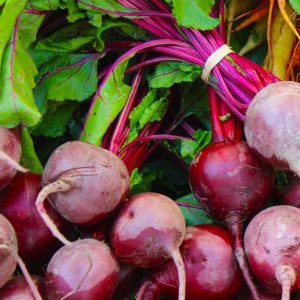
Whenever we see fresh beets growing in a garden or stocked in a store, we wish we had new ideas for preparing a vegan beet-based dish. In a previous issue of VRG’s Journal, Debra Daniels-Zeller wrote an article offering many suggestions including Orange Beet Puree, Savory Baked Beets with Horseradish Sauce, Roasted Rosemary Beets, Creamy Beet Green Chowder, Spicy Sesame Beets and Greens with Jasmine Rice, Smoky Tempeh with Beets and Wilted Greens over Pasta, Balsamic-Basil Pickled Beets, and Borscht.
Read the entire article here: https://www.vrg.org/journal/vj2000sep/2000_sep_beet_it.php
Subscribe to Vegan Journal in the USA only by visiting https://www.vrg.org/member/2013sv.php
Category
Uncategorized
Comments
0
Posted on
September 09, 2023 by
The VRG Blog Editor
Category
Uncategorized
Comments
0
Posted on
September 08, 2023 by
The VRG Blog Editor
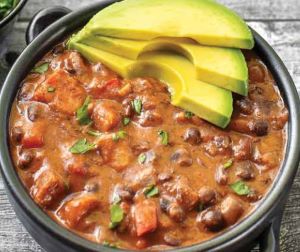
Colombian Black Bean Soup photo by Hannah Kaminsky
Hannah Kaminsky shares several delicious black bean-based vegan recipes in the latest issue of Vegan Journal. Enjoy Colombian Black Bean Soup, Mole Enchiladas, Black Bean Chipotle Chile, Loaded Spanish Sweet Potatoes, and Tex-Mex Pasta Salad.
Read the entire article here: https://www.vrg.org/journal/vj2023issue3/2023_issue3_modern_classics.php
To subscribe to Vegan Journal in the USA, see: https://www.vrg.org/member/2013sv.php
Category
Uncategorized
Comments
0
Posted on
September 08, 2023 by
The VRG Blog Editor

Photo from Spicy Moon
Finally had a chance to dine at Spicy Moon’s East Village location in New York City. Their vegan Szechuan Chinese food is absolutely delicious! If you’re into spicy dishes, this restaurant is definitely worth a try. We enjoyed Dan Dan Noodles and Scallion Style Mixed Vegetable with Bean Curd. The food was perfectly cooked and beautifully presented.
There are 3 locations for Spicy Moon in New York City. Information can be found here: https://www.spicymoonnyc.com/
Category
Uncategorized
Comments
0







